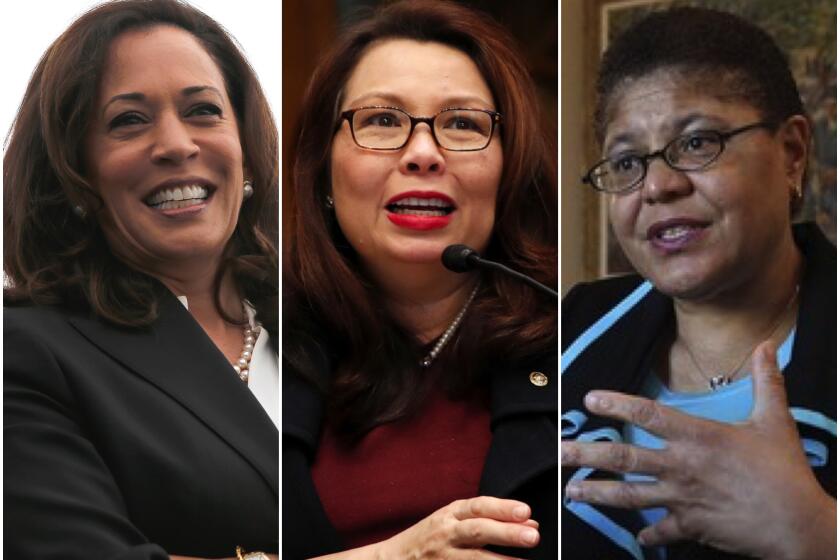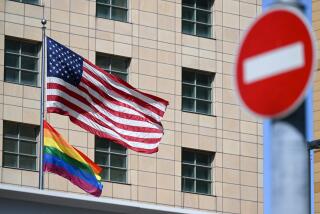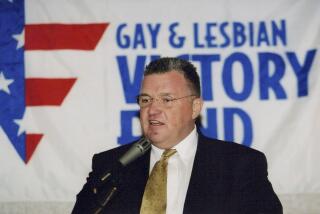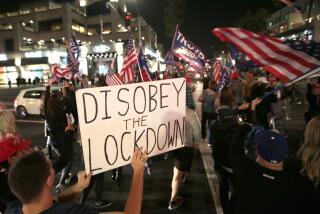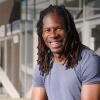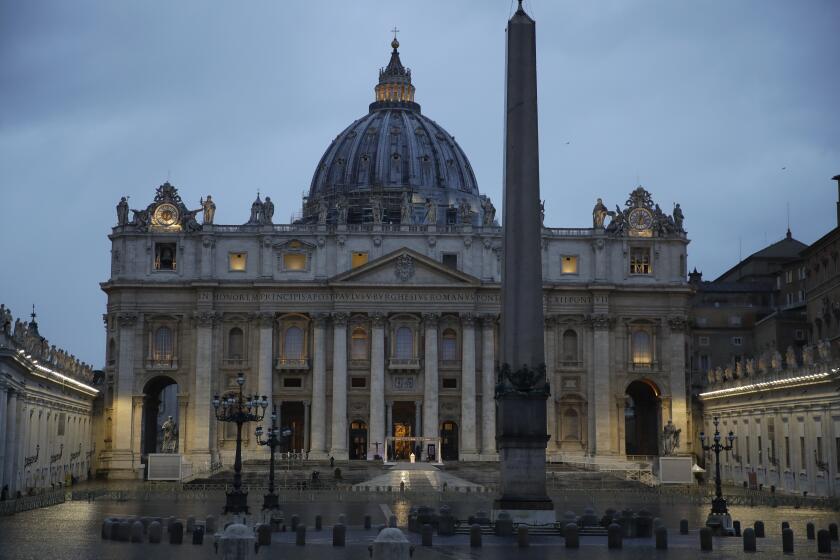Column: Pete Buttigieg on running as a gay man and his struggles with Black voters

Pride 2020 is officially in the books and man, it was complicated: The COVID-19 pandemic forced organizers to cancel parades; the horrific deaths of Breonna Taylor, George Floyd and Ahmaud Arbery sparked a month-long Black Lives Matter protests, many joined by the LGBTQ community in a show of solidarity; marriage equality turned 5; and the Supreme Court ruled it was illegal to fire someone for their sexual orientation or gender identity.
Then there’s Pete Buttigieg.
The former mayor of South Bend, Ind., joined the ranks of groundbreaking LGBTQ politicos such as Harvey Milk, Barbara Jordan and Barney Frank when he announced his candidacy for President in April 2019. His victory in the Iowa Democratic Caucus — in which he won 61 of 99 counties and most rural areas — signaled a watershed moment different from the others. LGBTQ youths might no longer be forced to choose between leaving their conservative small towns or spending their lives in the closet. Buttigieg’s performances in Iowa as well as New Hampshire, where he tied with Bernie Sanders for pledged delegates, were markers Pride was made to celebrate.
On Tuesday, the last day of Pride, I spoke with Buttigieg about his historic campaign, his struggles to reach Black voters and whether or not he’s going to run again.
Q: Do you ever get tired of hearing you made history?
Buttigieg: No. I’m so humbled to have been able to play that role. Look, I’m very much standing on the shoulders of giants and the best thing I can say about having had that historic campaign is that it will hopefully make it a little bit easier for other people who come along in the future. There is such a long chain of events from back through the origins of Pride some 50 years ago and on into the future of LGBTQ equality that is still a long way from being complete or secure. It wasn’t the main reason I ran for president, I wanted to be a president for everybody but over time came to really embrace and be honored by the chance to play that role.
Joe Biden is coy about his vice president list, but his consideration of women of color is a milestone. Experts say it shows progress and the need for more representation.
Q: What do you think years from now the rural community is going to think about your candidacy? We already know what the urban Americans are going to think — you’ll be celebrated — but what about rural America?
A: One of the things about the LGBTQ community is that we’re everywhere. I can’t think of any other minority, other than the community of Americans with disabilities, who have this range across every racial and geographic group. There is a queer experience in rural America that is definitely different than that of our larger cities, but it’s very real. I really prided myself on the way our campaign really succeeded, especially in some of those counties in Iowa that helped deliver our caucus win. The very places that famously voted for Barack Obama and then Donald Trump. Being able to reach out to people, neither downplaying nor being completely identified by identity. I hope it will make it easier for those people in those communities to live full lives as themselves.
Q: Were you surprised at all that despite being openly gay and proud that you weren’t embraced by the more liberal arm of the LGBTQ community?
A: Our community sometimes polices its own boundaries. I quickly realized that if I tried to sort myself into other people’s views of what a gay person ought to look like and try not to be not gay enough or too gay, I would be defeating the whole purpose of coming out, which is just to be who you are. If you have a different view on a policy issue and you’re also queer, it’s not like you have to vote for somebody who is part of the LGBTQ community so I respect that in a lot of ways. The only thing I took issue with was this idea that there’s one way that’s better than some other way to be out or to be queer. The whole idea of pride is the power of being your authentic self.
Q: It’s been my experience that a number of cisgender, white males who are gay feel as if they can identify with racial minorities because of that. But you were handcuffed a bit at this intersection and struggled getting Black votes. Why do you think that was?
A: I’m not sure it had anything to do with sexuality, [but that] every struggle for recognition and every struggle for equality is different. One of the really remarkable things about Joe Biden, he’s really the only candidate to have a level of trust and if you dig into numbers, double-digit support in the Black community, and I think a lot of that was a relationship built over time. I think about that here at home where not only do I have strong supporters and harsh critics in the Black community, but a lot of people who support me strongly in some of my choices and disagree with some of the others and that’s what a real relationship is like, especially with voters who I think have often felt and been taken for granted.
Frankly, it’s better if people can see who you are over years when you’re not asking for something, when you’re not running for President. It’s one of things — whether I ever run for office again or not — that I’m really thinking about in terms of meeting this moment is how to take the tools that are now in my hands to be an effective ally. Especially at this moment that is bringing such a reckoning with so many standing up — Black voices saying what they’ve been saying all along and a lot of well-intentioned white people maybe waking up to this in a different way — making sure that I’m able to do my little part to help meet the moment so this really does become a country where it’s beyond question that Black lives are valued equally.
The story surfaced like one of those trial balloons we’re used to seeing out of political offices and campaigns — Republican insiders telling Fox News that President Trump is grumpy about his reelection prospects and might quit the campaign if his poll numbers don’t improve.
Q: When it comes to the vote of the Black community, you’re right Joe Biden had a significant margin, but when you reflect back on your own candidacy where do you think you missed the mark?
A: It was really important to build that kind of engagement from Day 1 and it took us more time to find a voice, there were missteps. And we were also dealing with the anguish in my own community, especially after a police shooting of a Black man that took place in the summer of last year. I think we were really finding our voice once I spent more time listening than talking … to really make sure what I had to say was reflecting not my view of the world according to Pete but trying to channel the experiences of others.
Q: You said “If I run for public office again.” I think a lot of us, given your age, just assumed you would run for office again. Is that still a debate for you?
A: I love public service but you don’t run for office just to run for office. Every time I’ve decided to seek an office it’s because I saw a moment where the office called for something and I brought something to the table and there was a match. A lot of times I’ve decided not to run for office by going through the very same process. Looking at what I felt the office needed in that moment and thinking about why it would be different if it was me and not someone else there.
Q: Give us an example of that, when you decided not to run for an office [that it was] because it wasn’t the right moment.
A: A lot of times I was encouraged to run for Congress and I think that’s very important, but I knew the work I was doing as mayor was [then the right] fit. I never would have thought I would have been running for president at the age that I did and from the office that I did. Needless to say, nobody two years ago was saying who is going to jump into the millennial, Midwestern, gay mayor lane, right?
Q: I didn’t even know that was a lane.
A: Well it wasn’t. But I saw this moment where it just felt like there was this crisis of belonging, I sensed I could speak to that in a way that maybe was different than how others could. I sense there was a story to be told about my community and where I came from that would resonate … and I felt I had to go out and share that message and see if others agreed and it turned out a lot of people did.
More to Read
Get the L.A. Times Politics newsletter
Deeply reported insights into legislation, politics and policy from Sacramento, Washington and beyond. In your inbox three times per week.
You may occasionally receive promotional content from the Los Angeles Times.
